I’ve been following Pacific Northwest gardens and nurseries for decades and often fantasize about having a garden in a modified-mediterranean, 40 inches-of-rain-a-year zone 8. There’s lots of plants I’d be able to grow for the first time, but there’d have to be some sacrifices too, I assumed (agaves!). What would that mythical garden look like? The answer came sometime around 2010, when a blog was launched that chronicled the making of a desert plant lover’s paradise in Portland, Oregon (thedangergarden.com). I was immediately hooked on Loree’s fierce determination to make a garden that conformed to her vision no matter what the conventional horticultural wisdom or her climate seemingly otherwise insisted. This was hugely reassuring news to me, that the architectural plants I loved could thrive in the PNW. My daydream could live on!
Now that her garden has grown into a magazine-worthy success, Loree has written a book that details how she incorporated a mighty lust for spiky plants and a strong design sensibility into her winter-rainy, occasionally snowy Portland garden. And her single-mindedness in the pursuit of growing the plants she loves has resulted in a book that will be an invaluable primer, and not just for growing desert and tropical plants in less-than-ideal climates. The results of Loree’s investigations into soil, drainage, microclimates, cold and wet tolerances are universally applicable to gardens everywhere. And once you absorb these principles, her strong design eye will guide you past the potential pitfalls of being a kid let loose in a candy shop now that your choice of plants and garden style have been blown wide open.
Through Loree’s blog, and now clearly laid out in her book, I learned the trick of scouring genera for its hardiest members, even the most unlikely candidates like the palm family. To wit, the PNW’s beloved “trachys” (Trachycarpus fortunei and T. fortunei var. ‘Wagnerianus’) are palms that will sail through a Portland winter. I discovered that an agave I’ve absent-mindedly grown here in Los Angeles, Agave parryi, is a star on the short list of agaves that can be grown outdoors year-round in the PNW. Through extensive research and visiting local nurseries and gardens, Loree has unearthed hardy alternatives in the spiky genera she loves. And through careful, thoughtful siting, some triumphant successes can be had with the borderline hardy too; a crucial point she emphasizes is the importance of regional experimentation, that traditional garden zone data can be misleading and needlessly inhibiting.
But what of the outright tender agaves I grow here in Los Angeles? I’d have to give those up in my mythical PNW garden, right? Not necessarily. This is where Loree’s contributions on the subject of overwintering frost-tender plants are invaluable. These are the tips knowing gardeners exchange informally, passalong wisdom that rarely makes it into books but that is obtained through hard-won, painful trial and error. One of the big strengths of Fearless Gardening is how it systematically details techniques for overwintering tender and borderline hardy plants, whether in a greenhouse, cold garage, a heated basement, or protectively shrouded in the garden.
The influence of Loree’s photo-rich blog spills over into this wonderfully photo-heavy book. Its dynamic layout strikes me as a gorgeous hybrid of a high-end garden magazine and Loree’s personal, friendly blog, that takes your hand and enthuses, Courage! You can do this!
Loree doesn’t garden for flowers alone but for the entirety of the plant itself, and I know that this preference mystifies some of her garden visitors. Growing what you love won’t please everyone, she warns. This emphasis separates her book from the majority of garden books, with their intricate advice on staking, fertilizing, pinching, pairing heights, timing, and colors of flowering plants, planting in threes (the “garden commandments” as Loree calls them) and keeping the flowers coming all summer through succession planting. And because all gardens depend on regional differences, even if they share the same zone, often this advice only succeeds in a very narrow range of conditions and, as a practical guide, is not worth the paper it’s printed on.
Instead of relying on the often unreliable performance of flowers, Loree builds her garden with the color and texture of leaves, bark, stems, trunks and berries, and deploys dramatic “vignettes” of containers with the same attention to detail that you’d bring to a book shelf or coffee table. (Indeed, Loree’s command of pots and containers deserves a book by itself.) By taking the focus off flowers, there’s no need to apologize to visitors, “Oh, you should have been here last week — the lupines and oriental poppies were fabulous!” And her preference for a clean, grid-like modernism bursting with exuberant planting brings to mind a temperament that combines both Ray Eames and one of her horticultural heroes, Ruth Bancroft.
You don’t need to know Loree’s blog to enjoy her book. In fact, the book gives her the room to really develop and then distill what she’s learned, and it’s a joy to hear her full voice come through in, say, an opera instead of individual songs — to use an analogy from another of her garden heroes, the opera singer Ganna Walska, who created Lotusland in Montecito, California.
But I have to admit it’s a lot of fun to trace the development of issues first explored on her blog and find them now addressed in her confident, authorial voice — like the ethics of whether or not to remove mature plantings you inherited with your house just because you want something different. And though we encourage and are thrilled by their use as habitat for all sorts of creatures, Loree, like Ganna Walska, intuitively understands that all gardens are artifice, fiction not nonfiction, and this grasp frees her to explore whatever direction her heart and mind dare to go. And from her deep admiration of Lotusland and The Ruth Bancroft Garden I sense the notion that if the garden is like any other art form it is the stage — and though her garden is beautiful year-round, I sense for Loree, emotionally, it’s a summer production, Portland’s dry season, with many of its players whisked off stage in October and safely ensconced in warm, dry digs for the rainy winter. This is especially true for her private back garden. And she challenges the reader to likewise be bold in their conception of what a garden can be, drawing on what they love to grow and then fearlessly exploring the often hidden possibilities of where they garden to make it happen.
Before I get into the details of the giveaway, I have one last story to share. In 2014 a group of Portland bloggers, including Loree, hosted a tour of gardens and nurseries for international garden bloggers. The tour is a result of months of planning, with the actual days of the tour itself akin to a marathon of herding butterflies, as bloggers are housed, kept on schedule, fed, entertained, loaded on and off buses. Utter exhaustion would seem to be what would engulf the planners at the tour’s end, but when I looked into Loree’s face as she said goodbye, she was in tears that it was over. From that moment I’ve been in awe of her devotion to the community of gardens and gardeners, which she has now poured into this wonderful book.
* * *
And now the giveaway: Timber Press wants to put Loree’s book in your hands. And not only Loree’s book Fearless Gardening, but a book on one of her cherished mentors, Ruth Bancroft, entitled The Bold Dry Garden by Johanna Silver. (Both books to the same winner.) If you’re interested and living in the contiguous U.S., and unlike me haven’t been given a review copy already, leave a comment to be eligible for both books. I’m also going to include Instagram followers in Timber Press’ generous offer, so while you’re checking my IG feed, be sure to follow Timber Press as well — we’ll make a selection randomly from the comments through the month of January.
Good luck, and happy reading!


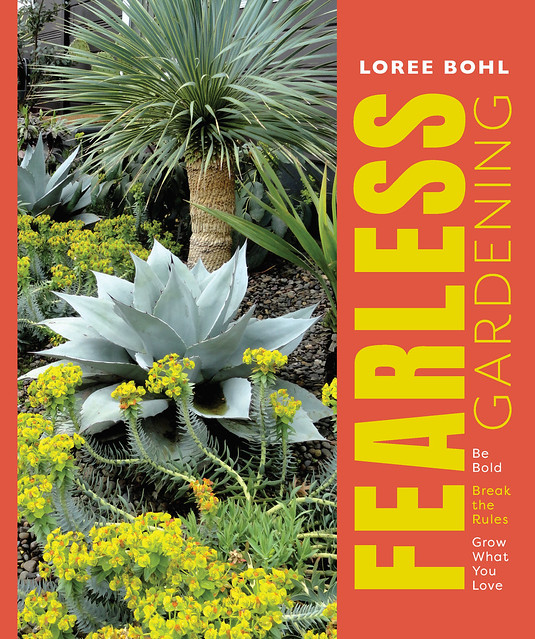
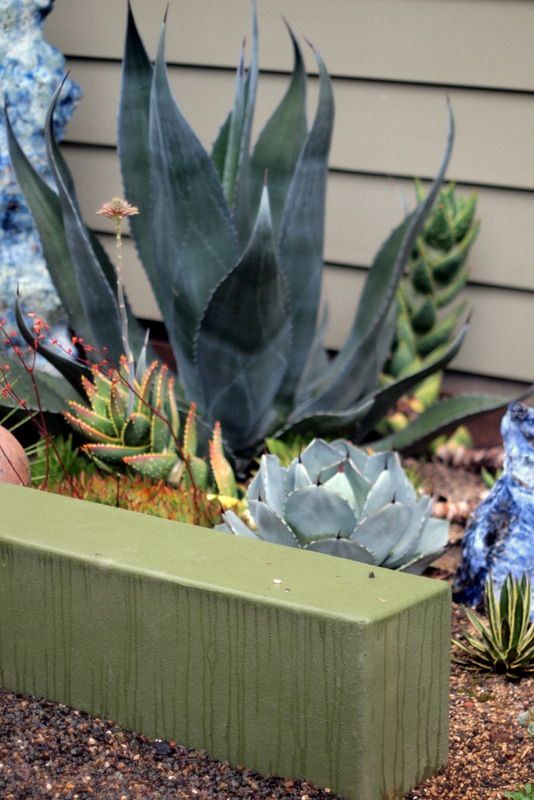


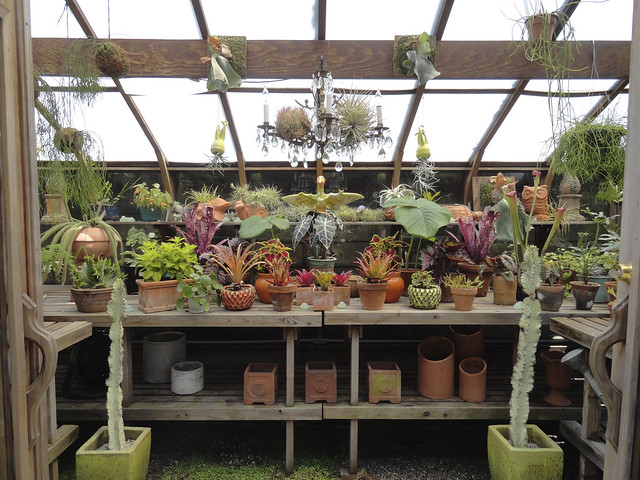
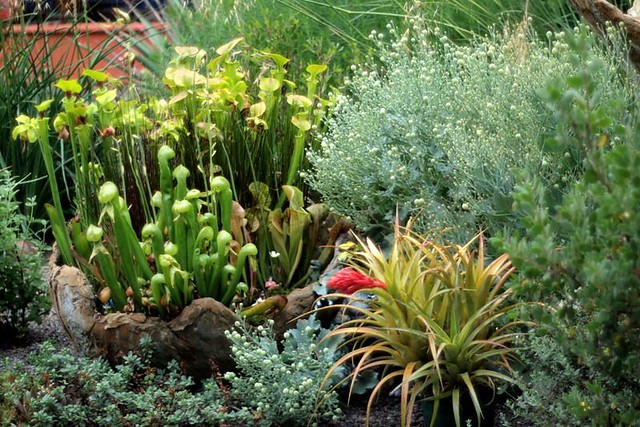


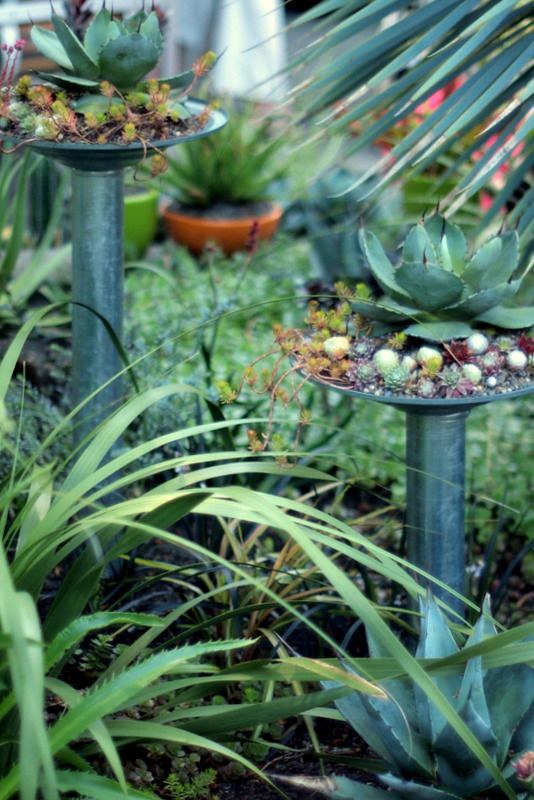
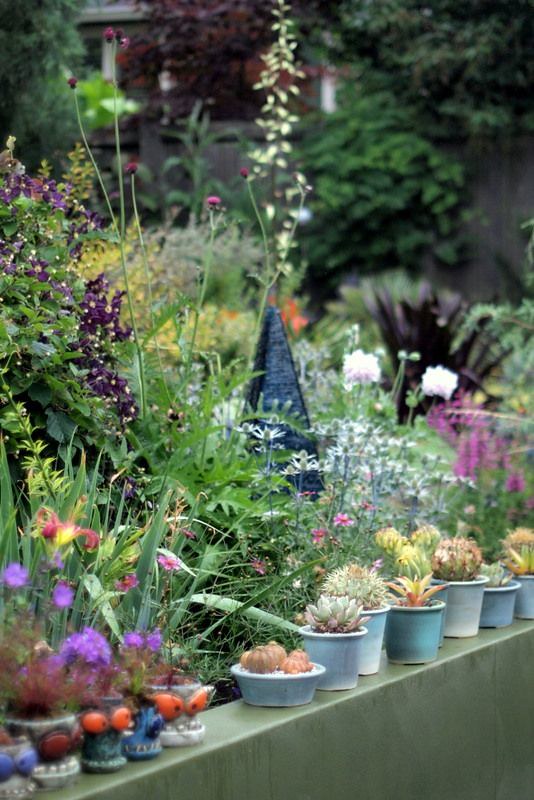

Just the other day I looked at my Lophocereus marginatus/Stenocereus marginatus and realized just how much they’d grown. I vowed to go back and find a older photo, then forgot to do so. But here they are in your image “my photo of a detail of Loree’s containers”…thank you! Also thank you for this thoughtful review and for reminding me of just how much fun the Portland Fling was. Gardeners (and garden bloggers) are the best people.
Loree, the fencepost cactus have been on my mind since a local restaurant, now out of biz, enclosed their restaurant with them, now over 8 feet high! A couple pieces have been knocked off, laying on the ground…tempting, tempting!
Loree’s book is a wonderful read for those of us who’ve been longtime fans of Danger Garden, and I’m certain she’ll win over a whole new troop of admirers with her new book. I enjoyed your review AND your fabulous photos of Floramagoria, another fearless garden. (Don’t add me to the drawing, as I’m giving away a copy of Loree’s book too.)
Pingback: Fearless Gardening book launch and GIVEAWAY - Digging
A great review, Denise. I appreciated your personal insights. I’ve always felt that you share much in common with Loree in terms of your garden aesthetic and your willingness to test your boundaries through experimentation. Obviously no need to include me in the drawing either as I’m also doing a giveaway albeit with a different book paired with Loree’s.
Most excellent review! Plus your gorgeous photos.
Fascinating stuff! Thanks for the chance to win.
Perfect timing for a book review and giveaway to not only provide much needed inspiration for my garden, but also a delightful distraction for gloomy winter blues.
I completely agree!
I really enjoy your blog and Loree’s – thank you both for sharing with all of us. I’ve asked my local library to purchase Fearless Gardening, but I don’t see it there yet. I wonder if I could bear to (eventually) donate the book if I win it? Or perhaps I’ll need to just buy one! That would be a good way to say thank you for the blog.
Jeanine, I bet you’ll want to keep it for your own personal library, but I like the way you think! Good luck!
I’m a lurker, but the potential of these books is too enticing.
I’m not sure how I found this blog – probably by Googling a specific plant by name – but I really love it. Thank you!